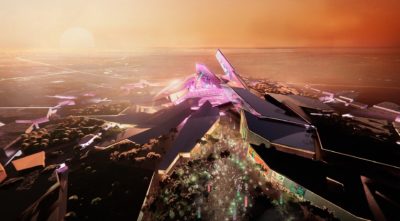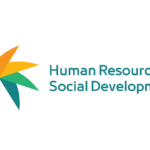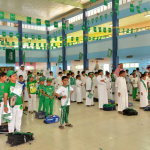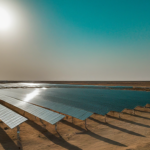
“The tourism sector lost an estimated 62 million jobs globally during the global pandemic. COVID-19 highlighted the vulnerability of the sector – not only to pandemics, but also, to the effects of extreme weather. Addressing climate change is at the heart of building a more resilient tourism industry, and there is no resilience without sustainability. We must work collaboratively to put sustainable and resilient tourism at the heart of inclusive recovery to ensure long-term sector resilience – for people and planet. Only by doing these things together will we ensure a better and more resilient future for the millions of people around the world who rely on tourism.”
–HE Ahmed Al Khateeb, Minister of Tourism of Saudi Arabia, at the 76th Session of the United Nations General Assembly, delivered a keynote speech emphasizing the critical need to accelerate climate action to ensure a sustainable future for the tourism sector. [Ministry of Tourism]

“Saudi Aramco’s global marketing organization — with offices in key cities throughout the world — follows regional oil market developments very closely, and this allows them to fine-tune differentials based on subtle regional shifts in market fundamentals. For example, if Asia needs more diesel fuel, Aramco might price crudes that yield a higher share of diesel to be directed toward Asian markets. It is an incredibly efficient and well-informed organization, allowing the Aramco to maximize revenues from its oil sales within the policy framework set by the Energy Minister.”
Is Saudi Arabia Quietly Trying To Help Europe’s Oil Consumers? [Baker Institute]

“Saudi Arabia’s Jeddah Season attracted over 200,000 visitors in the first three days of its launch. The season will run for 60 days and feature over 2,800 events, 60 entertainment games, 20 concerts, and four international exhibitions. The event is spread across the city to allow visitors to experience many of the unique attractions.”

“I’ve met Saudis over the decades who were educated abroad, became members of a globalized world, and yet returned home and retained their cultural values: the men still wearing ghutras and agals (traditional Saudi Arabian headdress and cord), the women wearing abayas and hijabs. Saudis have become cosmopolitan without becoming rootless. Al-Balad is at the heart of those roots.”
To see Saudi Arabia, start with this ‘magical’ gateway to Mecca [National Geographic]

“2.02% of households across the Kingdom use solar energy in their houses.”
The Saudi General Authority for Statistics published a comprehensive report titled “Household Energy Statistics for 2021” [Zawya]

“Saudis are keenly aware of the price of global warming—we live in a desert—and of the fact that oil is a limited resource. That’s why the crown prince’s signature NEOM project, which involves the creation of a new technologically-advanced city in the desert, is also the single largest potential investment in urban green energy concepts on the planet, with a current budget of $500 billion. By contrast, the price tag on Biden’s discretionary green energy initiatives this year is less than a tenth of that number—$44.9 billion, according to the White House. If your goal is clean energy, NEOM should be your partner—not China’s partner.”
-Mohammed Khalid Alyahya, visiting fellow at Hudson Institute and the former editor-in-chief of Al Arabiya English. [National Interest]

“The decade-long transformation of all aspects of the Saudi ADR (Alternate Dispute Resolution) practice, profession and industry outlined in this article has been profound, comprehensive and likely to endure. Importantly the Saudi judiciary has a solid record of skilfully and consistently adjudicating matters related to arbitration; and providing the judicial support required for a consistent record of successful enforcement of local and foreign arbitral awards. With its now well established local, regional and international reputation as a first-rate ADR institution, the SCCA benefits from operating in an arbitration-friendly jurisdiction – reflected in its rapidly increasing caseloads.”

“While most of the tech sector comprises companies with fewer than 50 employees, it is the businesses that grow larger that can provide the most benefit. Scaled companies tend to pay higher average wages, are likely to keep growing once they surpass 50 employees, and can be more resilient during economic downturns. Riyadh’s active tech companies that have reached scale tend to be older companies that have taken many years to reach that size. Now is the time to devote resources to help newer companies achieve their potential.”
Mapping the Riyadh Tech Sector [Endeavor Insight]

“Even with oil fetching more than $100 a barrel, and pressure from the Biden administration for oil companies to pump more to help ease high gasoline prices, investors have continued to push companies to remain frugal when it comes to oil-field investments. Instead, shareholders are seeking increases to dividends and buybacks after years of losing money on the sector.”
[WSJ]

“If you are judging Saudi Arabia in a global context, then there are things to take notes on. But if you are judging Saudi Arabia relative to itself, the [cultural] growth rate and the learning curve is unprecedented. We have a lot of learning to do, and we have a lot of healing to do. And we’ve got to face ourselves and have uncomfortable conversations. But I can see the change.”
-Hisham Fageeh, Saudi Arabian actor, writer and producer. Saudi Arabia Audiences Grow as Local Comedies Succeed [Variety]











